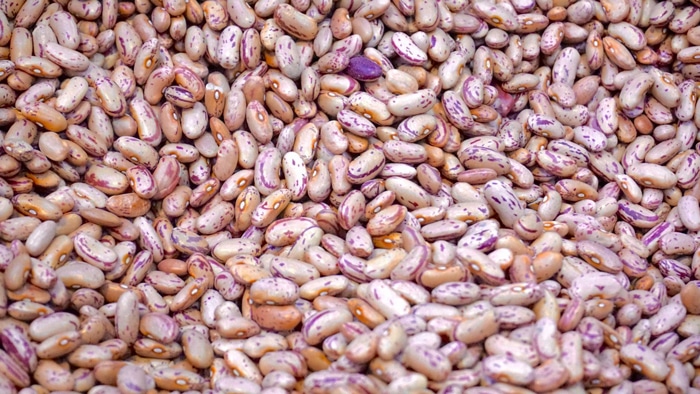

People with type 2 diabetes are often advised to reduce their carbohydrate intake. But high-carbohydrate whole food, plant-based (WFPB) diets have been associated with better health outcomes for people with or at risk of developing diabetes.
What explains this apparent contradiction? Why does a WFPB diet for diabetics appear to be effective despite the carbohydrate content? It all comes down to how whole plant foods—including their carbohydrates—affect the body.
What are carbohydrates?
All carbohydrates are made up of sugar molecules containing carbon, hydrogen and oxygen. They have four main molecular structures:
- Monosaccharides: one sugar molecule
- Disaccharides: two bonded sugar molecules
- Oligosaccharides: three to ten sugar molecules in a chain
- Polysaccharides: long chains of sugar molecules strung together
These carbohydrate structures are found in plants, mushrooms and milk; meat contains no carbohydrates, and eggs have only a small amount. Monosaccharides and disaccharides are usually grouped together as “simple” carbohydrates, while oligosaccharides and polysaccharides are referred to as “complex” carbohydrates.
Carbohydrates are not inherently “good” or “bad.” Many nutritious foods, including fruits and vegetables, contain both simple and complex carbohydrates. And although carbohydrate molecules make up all plant structures, diabetics don’t appear to experience blood sugar spikes from eating plant-based diets.
Is a plant-based diet safe for diabetics?
Plant-based dietary patterns are associated with increased insulin sensitivity, not higher blood sugar.[1] This means the body is able to move sugar out of the blood and into cells more efficiently, where it’s used to make energy.[2] Also, the fiber in whole plant foods slows the release of sugar as food is metabolized, preventing the blood sugar spikes associated with low-fiber refined carbohydrates.
Overweight and obese individuals who adopt whole food, plant-based diets can also benefit from losing excess weight, which in turn increases insulin sensitivity. Keeping insulin at reasonable levels regulates hunger by allowing leptin, the satiety hormone, to trigger feelings of fullness.[3] Combined with fiber’s satiating effects, this can prevent overeating and make it easier to maintain a healthy weight. Weight loss combined with plant-based eating patterns may also reduce the amount of fat stored in the liver[4]—an independent risk factor for type 2 diabetes.[5]
These effects may be why carbohydrates from plant-based foods are usually shown to be protective against diabetes when compared to highly refined carbohydrates.[6]
A whole food, plant-based diet accomplishes these goals. Even though it’s higher in carbohydrates, diabetics benefit from these types of carbohydrates.
What are good carbs for a diabetic to eat?
Plant-based doctors and the American Diabetes Association[7] agree that carbohydrates from plant foods are the best choice for diabetics. A WFPB diet provides a wide range of nutrients to support health, among which carbohydrates are only one component.
Diabetics may get particular benefits from eating beans, which contain a type of carbohydrate called resistant starch. This starch doesn’t break down during digestion, and therefore has no effect on blood sugar levels.[8] Instead, it travels to the colon, where gut bacteria metabolize it to produce beneficial byproducts like short-chain fatty acids. Emphasizing beans in the diet as a source of protein and carbohydrate may improve blood sugar control even better than switching from refined grains to whole grains.[9]

To enjoy the best results from a plant-based diet for diabetics:
- Emphasize complex carbohydrates from beans, whole grains, fruits, vegetables, nuts and seeds
- Choose non-starchy vegetables like leafy greens, carrots and peppers more often than starchy vegetables like potatoes and squash[10]
- Stick with low-sugar fruits like berries, kiwis, melons and citrus fruits [11] until blood sugar starts to stabilize
- Avoid foods with the fiber removed, such as refined grains, refined sugars and fruit juices
Adopting these habits creates the kind of healthful dietary patterns associated with lower diabetes risk,[12] which include a balance of plant-based proteins and healthy fats in addition to carbohydrates. Scientific reviews of vegetarian diets and diabetes demonstrate that the “most important” characteristics are increasing whole plant foods and reducing saturated and trans fats.[13]
A WFPB diet accomplishes these goals. Even though it’s higher in carbohydrates, diabetics benefit from the types of carbohydrates—along with the other nutrients—in plants. From promoting healthier body weight to increasing insulin sensitivity, carbohydrates from whole plants can improve health outcomes in cases of type 2 diabetes.
References
- McMacken, Michelle, and Sapana Shah. “A Plant-Based Diet for the Prevention and Treatment of Type 2 Diabetes.” The Journal of Geriatric Cardiology, May 23, 2017. https://doi.org/10.11909/j.issn.1671-5411.2017.05.009.
- “Carbohydrates and Blood Sugar.” The Nutrition Source. July 25, 2016. https://www.hsph.harvard.edu/nutritionsource/carbohydrates/carbohydrates-and-blood-sugar/.
- Vieira, Ginger. “Type 2 Diabetes and Plant-Based Diets.” Healthline. July 23, 2019. https://www.healthline.com/health-news/the-right-plant-based-diet-can-lower-your-risk-for-type-2-diabetes#It-isnt-just-insulin-resistance.
- Kahleova, Hana, Kitt Falk Petersen, Gerald I. Shulman, Jihad Alwarith, Emilie Rembert, Andrea Tura, Martin Hill, Richard Holubkov, and Neal D. Barnard. “Effect of a Low-Fat Vegan Diet on Body Weight, Insulin Sensitivity, Postprandial Metabolism, and Intramyocellular and Hepatocellular Lipid Levels in Overweight Adults.” JAMA Network Open 3, no. 11 (2020). doi:10.1001/jamanetworkopen.2020.2.
- Mantovani, Alessandro, Christopher D. Byrne, Enzo Bonora, and Giovanni Targher. “Nonalcoholic Fatty Liver Disease and Risk of Incident Type 2 Diabetes: A Meta-analysis.” Diabetes Care 41, no. 2 (2018): 372-82. doi:10.2337/dc17-1902.
- “Busting the Top 10 Carb Myths – Today’s Dietitian Magazine.” Today’s Dietitian. https://www.todaysdietitian.com/newarchives/0416p30.shtml.
- “Get to Know Carbs.” Get to Know Carbs | ADA. https://www.diabetes.org/healthy-living/recipes-nutrition/understanding-carbs/get-to-know-carbs.
- “Resistant Starch.” Gastrointestinal Society. July 16, 2020. https://badgut.org/information-centre/health-nutrition/resistant-starch/.
- “Clinical Study Confirms That Beans Are the Preferred Starch Source for Diabetics.” Dr. Fuhrman. https://www.drfuhrman.com/blog/95/clinical-study-confirms-that-beans-are-the-preferred-starch-source-for-diabetics.
- Coyle, Daisy. “Starchy vs Non-Starchy Vegetables: Food Lists and Nutrition Facts.” Healthline. October 03, 2018. https://www.healthline.com/nutrition/starchy-vs-non-starchy-vegetables.
- Cafasso, Jacquelyn. “Low Sugar Fruits: For Diabetes and Health.” Healthline. April 17, 2020. https://www.healthline.com/health/best-low-sugar-fruits.
- Qian, Frank, Gang Liu, Frank B. Hu, Shilpa N. Bhupathiraju, and Qi Sun. “Association Between Plant-Based Dietary Patterns and Risk of Type 2 Diabetes.” JAMA Internal Medicine 179, no. 10 (2019): 1335. doi:10.1001/jamainternmed.2019.2195.
- Olfert, Melissa D., and Rachel A. Wattick. “Vegetarian Diets and the Risk of Diabetes.” Current Diabetes Reports 18, no. 11 (2018). doi:10.1007/s11892-018-1070-9.
Copyright 2026 Center for Nutrition Studies. All rights reserved.
Deepen Your Knowledge With Our
Plant-Based Nutrition
Certificate
Plant-Based Nutrition Certificate
- 23,000+ students
- 100% online, learn at your own pace
- No prerequisites
- Continuing education credits





